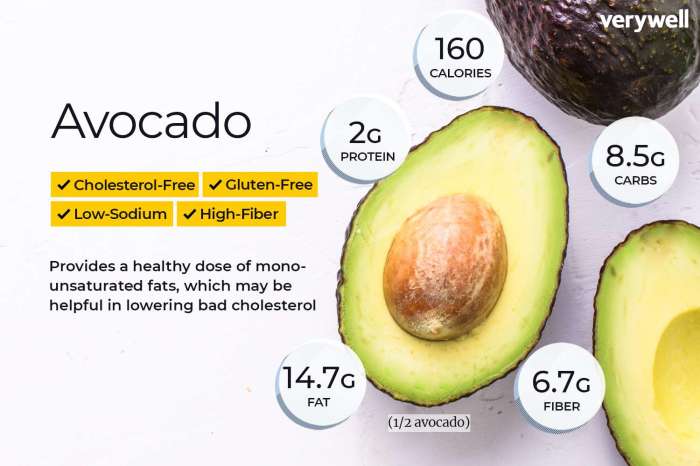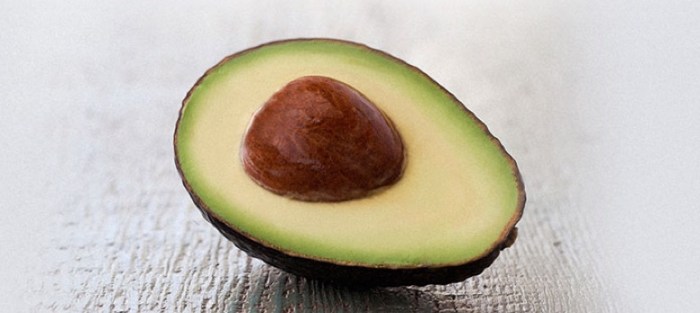Avocado Nutritional Profile
1 2 avocado nutrition facts – Let’s dive headfirst into the creamy, green goodness that is the avocado! Often hailed as a superfood, this fruit (yes, it’s a fruit!) packs a serious nutritional punch. Forget the guilt – we’re about to uncover why avocados deserve a prominent place in your diet.
Macronutrient Breakdown of a Medium Avocado (≈200g)
Avocados are renowned for their unique macronutrient profile. While they’re high in fat, it’s the
good* kind of fat, which plays a vital role in overall health. The following table provides a detailed breakdown
| Nutrient | Amount | % Daily Value | Unit |
|---|---|---|---|
| Fat | 23g | 35% | grams |
| Carbohydrates | 13g | 4% | grams |
| Protein | 4g | 8% | grams |
*Note: Daily values are based on a 2,000 calorie diet. Individual needs may vary.*
Avocado Fat Composition and Health Implications
The fat content in avocados is primarily composed of monounsaturated fatty acids (MUFAs), specifically oleic acid, the same heart-healthy fat found in olive oil. Avocados also contain smaller amounts of polyunsaturated fatty acids (PUFAs) and saturated fats. While saturated fat gets a bad rap, the amount in avocados is relatively low compared to the beneficial MUFAs. The high MUFA content is linked to improved cholesterol levels, reduced risk of heart disease, and potentially even better blood sugar control.
Vitamin and Mineral Content of Avocados
Avocados are nutritional powerhouses, brimming with essential vitamins and minerals. A single avocado contributes significantly to your daily intake of several key nutrients:
- Vitamin K: Essential for blood clotting and bone health. Avocados are a great source.
- Vitamin C: A potent antioxidant that supports the immune system and collagen production. Avocados provide a decent amount.
- Potassium: Crucial for maintaining healthy blood pressure. Avocados are surprisingly rich in potassium.
- Folate: A B vitamin vital for cell growth and development, particularly important during pregnancy. Avocados offer a good dose.
Potential Drawbacks and Considerations

Avocados: nature’s creamy green goodness. But like any delicious foodstuff, they come with a few caveats. While packed with nutrients, it’s crucial to understand their potential downsides to enjoy them responsibly and avoid any unwanted consequences. Think of it as appreciating the avocado’s full profile – the good, the bad, and the slightly-less-good.Avocados are undeniably calorie-dense.
One medium avocado can pack around 322 calories, a significant chunk of your daily intake. This isn’t inherently bad, especially if you’re active and need the energy, but it highlights the importance of mindful consumption. Overindulging can lead to unwanted weight gain, especially if you’re not balancing it with other aspects of a healthy diet and regular exercise.
Understanding the nutritional profile of one to two avocados is crucial for a balanced diet. Their healthy fats contrast sharply with the sugar content found in other beverages, like the significant amount in a 12-ounce serving of Mountain Dew, as detailed on this page: mountain dew 12 oz nutrition facts. Returning to avocados, remember to consider their potassium content alongside other dietary choices.
Imagine eating three avocados in one sitting – that’s almost 1000 calories! Better to spread the creamy goodness throughout the week.
High Calorie Content and Portion Control
The high calorie density of avocados necessitates portion control. A single avocado, while nutritious, contributes significantly to your daily caloric intake. Consider incorporating it strategically into your meals, rather than consuming it as a standalone snack. For example, half an avocado on your toast provides a satisfying and nutritious meal, without the calorie overload of a whole one.
Think of it as a delicious, nutrient-packed condiment, not the main course. A simple visual aid: imagine comparing the size of half an avocado to the size of a small fist. Aim for portions around that size to manage your caloric intake effectively.
Potential Allergic Reactions
While rare, avocado allergies do exist. Symptoms can range from mild skin irritation to more severe reactions like anaphylaxis. If you experience any symptoms such as itching, swelling, or difficulty breathing after consuming avocados, seek immediate medical attention. It’s always wise to introduce new foods gradually and monitor your body’s response. A small test portion initially is a sensible approach, allowing you to assess your tolerance.
Interactions with Certain Medications, 1 2 avocado nutrition facts
Avocados contain vitamin K, which can interfere with the effectiveness of certain anticoagulant medications, like warfarin. Consistent avocado consumption could potentially affect the blood’s clotting ability. Individuals on such medications should consult their physician or pharmacist regarding the appropriate intake of avocados and other vitamin K-rich foods. It’s about finding a balance, not necessarily eliminating avocados entirely, but being mindful of the potential interaction and maintaining open communication with your healthcare provider.
Avocado Sustainability and Production

The creamy green goodness of the avocado comes at a cost. While delicious on toast, the environmental footprint of this popular fruit is a surprisingly thorny issue, raising questions about water usage, deforestation, and pesticide use. Let’s delve into the fascinating – and sometimes unsettling – world of avocado farming and its impact on our planet.The environmental impact of avocado farming is multifaceted.
Large-scale avocado production, particularly in regions with water scarcity, often demands significant irrigation, straining local water resources and potentially leading to water shortages for other agricultural uses or even human consumption. Additionally, the expansion of avocado orchards has been linked to deforestation, particularly in regions with fragile ecosystems. The clearing of land for avocado plantations can lead to habitat loss, biodiversity reduction, and soil erosion.
Finally, the use of pesticides and fertilizers in avocado cultivation can contribute to water pollution and harm beneficial insects and other wildlife. The transportation of avocados across vast distances also adds to their carbon footprint.
Water Consumption in Avocado Farming
Avocado cultivation is notoriously thirsty. A single avocado requires approximately 272 liters of water to grow, which means a large-scale operation can consume massive quantities of water. This high water demand is particularly concerning in arid and semi-arid regions where water resources are already limited. For example, in certain parts of Mexico, the expansion of avocado farming has been linked to decreased water availability for local communities.
Sustainable irrigation techniques, such as drip irrigation, are crucial in mitigating this impact. Drip irrigation delivers water directly to the roots of the plants, minimizing water waste compared to traditional flood irrigation.
Sustainable Practices in Avocado Production
Several sustainable practices aim to minimize the environmental impact of avocado farming. These include agroforestry, where avocado trees are integrated into existing forest systems, reducing the need for deforestation. Organic farming methods, which avoid synthetic pesticides and fertilizers, protect biodiversity and reduce water pollution. Water-efficient irrigation systems, such as drip irrigation, are essential for reducing water consumption.
Furthermore, careful land management practices, such as cover cropping and no-till farming, help improve soil health and reduce erosion. Finally, responsible waste management, including the composting of organic waste, can minimize environmental pollution.
Comparison of Avocado Cultivation Methods
Traditional intensive avocado farming, characterized by monoculture plantations and heavy reliance on chemical inputs, has the most significant negative environmental impact. This approach often leads to soil degradation, water pollution, and biodiversity loss. In contrast, organic and agroforestry approaches demonstrate significantly lower environmental footprints. Organic farming avoids harmful chemicals, promoting soil health and biodiversity. Agroforestry systems integrate avocado trees into diverse ecosystems, mimicking natural forests and enhancing ecological resilience.
The choice of cultivation method significantly impacts the overall sustainability of avocado production, highlighting the need for a shift towards more environmentally friendly practices.
Clarifying Questions: 1 2 Avocado Nutrition Facts
Can I eat avocado every day?
Moderation is key! While avocados are healthy, their high calorie count means daily consumption could impact your overall calorie intake. Aim for a balanced approach.
Are avocados good for weight loss?
Avocados are high in healthy fats and fiber, which can promote satiety and aid in weight management. However, portion control is crucial.
Do avocados go bad quickly?
Yes, once cut, avocados brown relatively quickly. Store them properly (in the fridge, with the pit in) to prolong their freshness.
Are there any avocado allergies?
Yes, though rare, avocado allergies can occur. Symptoms can range from mild itching to severe reactions. If you experience any adverse reactions, consult a doctor.
